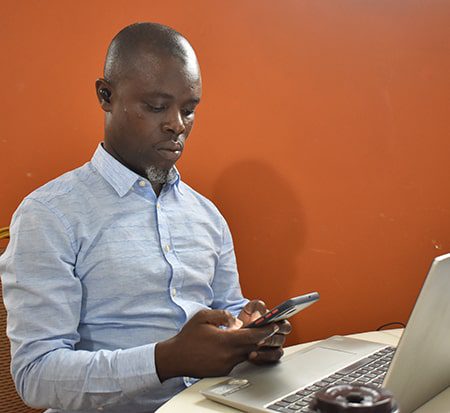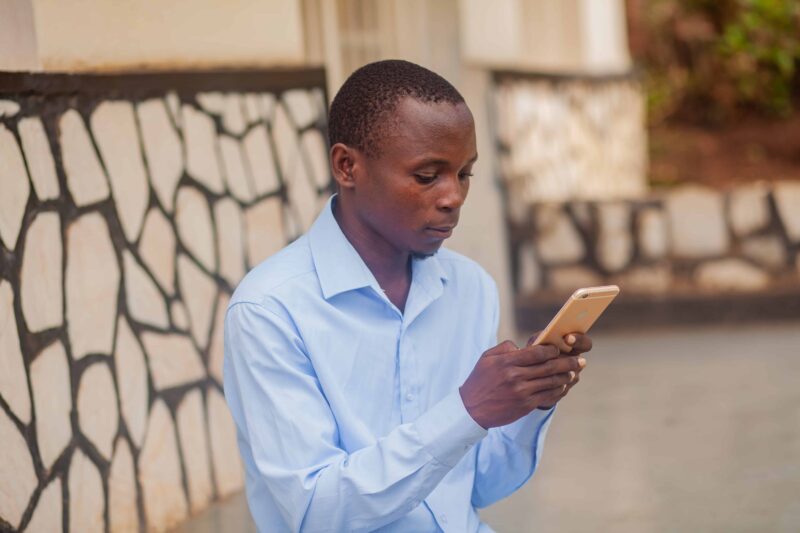By Adèle Sulcas
Surge of disinformation
In the early days of the COVID-19 pandemic, people with smartphones experienced a deluge of messages and videos on social media, largely made up of dangerous ‘advice’, xenophobia, hate speech, and conspiracy theories.
While European epidemics seemed to be stabilizing in March and April, these torrents of misinformation were circulating in developing countries. For journalists trying to separate truth from falsehood, this ‘infodemic’ made understanding more about the virus – and explaining it to the public – all the more difficult. This was especially troubling for journalists in developing countries where COVID-19 was still a relatively new phenomenon and where obtaining accurate scientific information can be challenging at the best of times.
Perhaps the most harmful example – for Africa, in particular – alleged that black people were resistant to the coronavirus, that it was a “white” disease. In May, the American ‘Plandemic’ conspiracy theory video featured a discredited scientist who claimed that a sinister group of people and organizations was using COVID-19 to further their quest for profits and power. (Within a week the video had been viewed on Twitter, Instagram, YouTube and Facebook more than 8 million times, not counting ‘shares’). Other examples that made the rounds in African countries included the promotion of an alleged ‘cure’ for the virus from Madagascar, and the alleged banning by the Tanzanian President of face masks.
Lack of accurate local information contributed to the “Infodemic”

Alpha Senkpeni, a Liberian journalist, says that the newness of COVID-19, the lack of accurate, localized information in the public domain, and the scarcity of trusted local sources made reporting accurately on the burgeoning epidemic difficult. He quickly decided to turn the problem on its head, and use social media to disseminate factual, accurate information about the virus, and to provide a go-to resource for journalists with any questions or concerns about to how to report on it.
As a reporter during the 2014-2015 Ebola epidemic in Liberia, Senkpeni and others who had been part of an Internews rapid response rumor tracking and journalism training program for journalists, set up ‘Local Voices Liberia’ (LVL) a peer network of community radio stations in the program.
“We determined that the information needs of these communities are massive,” he says. “And if they can’t find information, they’ll create their own answers. The misinformation becomes entrenched and tends to undercut the science base of the response.”
LVL later expanded its remit to produce ‘Around the Country’ news bulletins, which now report on COVID-19 developments in different parts of Liberia and which other news outlets are incorporating into their coverage.
Internews responds with a health media fellowship and a “Chat with Experts”
With the arrival of COVID-19 in Liberia, Internews once more responded to the urgent information needs in the country and introduced a health media fellowship. To support this effort, Senkpeni drew on his networks to recruit a group of around 35 journalists in Liberia, and using WhatsApp as a platform, set up “Chat with the Experts”, a weekly live chat with a scientific expert to explain a specific topic that would be useful for journalists covering COVID-19, and public health more generally. Group members receive materials sometimes several days in advance (usually a powerpoint presentation) and have a chance to prepare and submit questions before the hour-long live chat, which takes place as a regular fixture on a Friday. During the chat, the expert responds to the group via text or voice note to questions members have submitted by text.
So far the topics covered include how to effectively report on ‘the numbers’ and simplify the data for local audiences, procedures for drug approval and certification for public consumption, the testing process for infection with viruses, COVID-19 vaccine development, analysis of situation reports and the nexus between the national responses to COVID-19 and Ebola. Depending on the expert’s wishes, their answers could be ‘on the record’ (and voice responses are then repackaged as audio clips for broadcast) or ‘for background research purposes only’ – in other words, not to be quoted. But either way, the experts’ contacts are given to the participating journalists, which enables individual follow up or set up interviews later.
The group and the live chats are achieving three main things, Senkpeni says. First, they help to give reporters an in-depth understanding of a specific science topic or problem. Second, they build over time a knowledge base, creating for reporters a set of resources, including recordings and written content, that they can always refer to, while providing other reporters who were not part of the chat access to the content, via low-cost platforms such as YouTube videos. Third, the chats give reporters the opportunity to connect with a trusted source who is not from government, not influenced by politics, and who is comfortable talking to the media. “Experts are often very very very wary of talking with journalists,” Senkpeni says. “The fear is, ‘I don’t want to be misquoted’.”
Journalists become “influencers” in their communities
For journalists who have learned about health reporting, behaviour change and evolving science during the Ebola epidemic, this is also an opportunity to become ‘influencers’ in their communities and in society. This is especially important given the dangers of misinformation and a history of flagrantly unbalanced reporting in the country, Senkpeni says. The media landscape in Liberia is “massively challenged by mercenary journalism,” he says, explaining that in Liberia, “it’s difficult to separate politics from anything.”
One recent example: a radio host telling his audience that there were no COVID-19 cases in the country, and that the government was peddling fear by fabricating case numbers, in order to attract funding from the World Bank and the U.S. government. “This disrupted the early response efforts,” Senkpeni says, and still has some impact on how people view the outbreak now.
Importance of local sources
“It’s also important to decolonize some of these messages,” Senkpeni says, “because when messages come from WHO or Johns Hopkins or the Lancet or the CDC – any foreign-based source – there’s suspicion [about them] and conspiracy theories. That’s why we need a local source who can be relied upon by local journalists who can tell the story from a local perspective but from a scientifically sound perspective as well.”
Alpha took inspiration from an initiative of Rwandan journalist Christophe Hitayezu, who started a WhatsApp group for journalists in Sub-Saharan Africa before COVID-19 even registered as the all-consuming story it has become. Christophe had attended a global webinar in early March entitled ‘The Role of Media in Containing COVID-19 and Saving Lives’, convened by the IFRC with representatives from WHO, Internews, and BBC Media Action. For journalists from Sub-Saharan Africa, the virus had not yet fully arrived, but the story with its complexities was looming. The webinar brought home for Hitayezu an important realization: there were far more questions than answers and journalists needed to get ahead, connect and learn. “In my region [East Africa], journalists haven’t been trained to cover the coronavirus,” Hitayezu says. “They needed to customize their knowledge and their reporting activities according to the new norms that come with the pandemic. Everything was stopped, so we weren’t able to gather together to have a training. It was a problem. So, I just thought about a digital tool that we could use as journalists to stay connected and share experiences and skills.”
Every member of the group – which now numbers about 130 people from 20 African countries – has the right to send updates, ask questions, or bring to the forum topics that could raise debate, Hitayezu explains. One example was a video of a woman in the US protesting against face masks being worn by the general public. “We had a lot of discussions about that. Depending on the topic, some people say this is or that is isn’t newsworthy, or it’s pure nonsense, while others would say ‘why can’t you just ignore this because it’s not from your region?’ ” Hitayezu said. “These topics make things interesting, and they stir critical thinking within the group.”
At the same time, he says, there are guidelines: anything not related to COVID-19 is not allowed. “What is recommended is that people bring [topics] that they think someone else will need to use in his work.” Those have included questions on issues such as the difference between a ‘treatment’ and a ‘cure’ for COVID-19, whether the virus is eliminated from the body after infection or remains (like HIV), tricky topics like the Madagascan ‘cure’ promoted as an “African” (and therefore preferable) solution and of course the vaccine story with its many angles from when? to how to ensure that people have confidence in it.
“There are a lot of uncertainties in this pandemic”, says Ida Jooste, Internews’ Global Health Media Adviser, “but one thing has been a constant for several months now: wake up, check phone, see vibrant new conversation on the ‘COVID-19 updates’ chat!” Jooste says it has been hugely rewarding for her to see shifts in the discussion, a reflection of the global knowledge shift: “At first everything about COVID-19 was new and strange, and it was incredibly hard for some to know what to believe and what not, but over time, through lived experience and peer and expert guidance on the group, the conversation has moved towards a nuanced appreciation of the science and a fun place to find story ideas and connections.”
Hitayezu, who now works some of the time for Internews mentoring journalists and running regular webinar and training sessions, takes care to ensure journalists get the guidance they need, and follows through to ensure they are connected with experts, in addition to moderating the ‘COVID-19 Updates’ group. “Rumor and misinformation has been a very big enemy of this fight,” he says. “But the group has helped a lot in unblocking the chain of misinformation, discussing how information can be verified, and why whatever you see on social media is not good to re-use or share before verification.”
Though the Liberian and Africa-focused groups differ in their breadth and focus, they arose out of similar needs and are achieving similar ends, by helping journalists report the facts. Senkpeni’s group is strongly focused on applying local expertise and context to the epidemic via the weekly live chat, while Hitayezu’s group acts as a forum for people from across Africa to share updates from their different locations and share skills, apart from clarifying complex scientific topics or correcting misinformation.
Senkpeni also has a longer-term goal: to help forge relationships between journalists and trusted sources in their respective countries. “Apart from providing expert opinion, this also helps to connect the sources with journalists,” Senkpeni explains, “so that the source knows that this person [asking a question in the WhatsApp group] is one of the key people who reports on science. We want to try and cement that relationship, so that the source has confidence that the reporter will not report from a sensational perspective.”
(Banner photo: Christophe Hitayezu Credit King Djalil)
